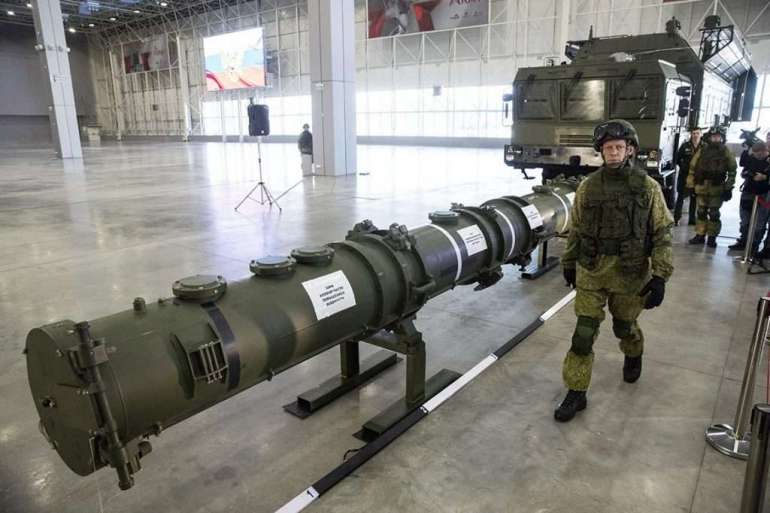Biden to seek full 5-year extension of nuclear pact with Russia

“The United States intends to seek a five-year extension of New START as the treaty permits,” White House Press Secretary Jen Psaki told reporters on Thursday. “The president has long been clear that the New START Treaty is in the national security interests of the United States.
“This extension makes even more sense when the relationship with Russia is as adversarial as it is at this time,” she added. “New START is the only remaining treaty constraining Russian nuclear forces and is an anchor of strategic stability between our two countries.”
The news, which was first reported by The Washington Post, comes after Biden pledged during the campaign to save the pact, one of the last vestiges of Cold War-style diplomacy designed to curb the spread of atomic arms.
The treaty, which provides for regular site inspections of the other side’s arsenal, is considered an insurance policy against a full-blown arms race.
“We cannot afford to lose New START’s intrusive inspection and notification tools,” said chief Pentagon spokesperson John Kirby. “Failing to swiftly extend New START would weaken America’s understanding of Russia’s long-range nuclear forces.”
Russia first offered to extend the treaty without preconditions in early 2020. But the Trump administration sought to negotiate a new agreement that paved the way for a follow-on treaty that covered more weapons, including tactical nuclear weapons that are not included in New START.
Those efforts were not successful in the face of Russian resistance and before the administration ran out of time.
The news that Biden will pursue a full extension was lauded by leading arms control advocates.
“President Biden’s offer signals a welcome return to serious diplomacy that provides a path to a safer and more secure future for all,” said Derek Johnson, chief executive of Global Zero, a leading disarmament group, in a statement. “Unless you’re a defense contractor, this is good news for everyone.”
Foreign Policy For America, a progressive group that advocates more reliance on diplomacy, said “extending New START on the first full day of the Biden presidency is a strong statement of support for nuclear arms control efforts.”
“The five-year extension will serve as the foundation for the Biden administration’s nuclear arms control efforts going forward and ensures there is a baseline for talks with Moscow,” it added.
The process for extending the treaty is relatively simple. It does not require the American and Russian presidents to be involved, said Rose Gottemoeller, a former undersecretary of State who negotiated the original treaty with the Russians in 2010 and now teaches at Stanford University.
“From the U.S. perspective the process is extremely simple,” she said. “It can be done by a simple exchange of diplomatic notes, where we confirm to each other that we are ready to extend New START for five years.”
The process could be “complicated a bit” on the Russian side, however, where the Russian Duma must hold a parliamentary vote.
“They say they can’t do just a simple exchange of diplomatic notes,” she said. “They have to have a kind of re-ratification. Whether they will insist that they have to do the legislative process or not I think is still an open question.”
The Biden administration also says it hopes to use the extension to begin talks on a new series of arms control measures.
“Extending the treaty’s limitations on stockpiles of strategic nuclear weapons until 2026 allows time and space for our two nations to explore new verifiable arms control agreements that could further reduce risks to Americans,” Kirby said in a statement.
Some leading experts also expressed some reservations about the decision to agree to a five-year extension.
Even some Biden advisers were calling for a one-year extension in order to pressure the Russians to begin negotiations on a follow-on treaty. For example, Victoria Nuland, who has been nominated to be undersecretary of State, recently called for a one-year extension of the treaty
“I didn’t know which way they would go,” said Tim Morrison, who oversaw the arms control portfolio on the National Security Council in the Trump administration. “It strikes me as an indication that Biden just thinks he has too many other things going on to undertake an actual arms control negotiation of his own. He is sort of taking a gamble that he won’t get a chance to make a treaty.”
Morrison, who is now a senior fellow at the Hudson Institute, believes the Russians “are not going to be interested in a follow-on discussion. At least not one Biden can sell.” For Moscow, he added, “any follow-on discussion probably needs to include space limitations and missile defense limitations and things that are just dead on arrival in the U.S.”
“The Russians are going to take a five-year extension, they are going to pocket it, and then they’ll say, ‘see you in 2026, Americans,'” he said.
Bradley Bowman, senior director of the Center on Military and Political Power at the Foundation for Defense of Democracies, also expressed concern that a full extension could be short-sighted.
“A copy and paste maneuver by the Biden administration that extends the treaty for five years risks undercutting America’s leverage with both Moscow and Beijing. Such a move would also make Americans less safe,” he said in a statement. “The treaty’s current formulation gives Putin a dangerous free pass to continue to develop and field a Strangelovian array of nuclear weapons not covered by the treaty.”